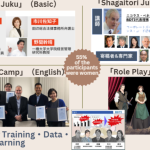
Yesterday I made a request below for donations to BDTI, on the occasion of my birthday. The results were: 1) one significant donation from the Swiss Institute of Directors; 2) one donation from an American in California, and one from a Canadian living in Guam; 3) four promises to donate from foreigners living in Japan; and 4) two donations from a Japanese person. Thank you to the supportive donors! … and thanks for the “likes”!
“On April 16th, 2023 I will be 67 years old. On this “occasion” I would like to ask you to consider donating to The Board Director Training Institute of Japan (BDTI), which I have led in offering director training in Japan for 13 years now, training more than 2,700 persons in programs, and many more via e-Learning. At the same time, going forward, I also will make a series of posts (on this discussion forum) giving a perspective or story related to corporate governance, based on recent events and/or my own 15 years of experience sitting on boards here, that will be light, easy reading but hopefully also be thought-provoking.
BDTI’s work is “missionary work” that requires passion and commitment. Perhaps these stories will be of interest in terms of revealing why I do what I do, the challenges that face Japan and its companies and investors, and how they can be overcome. This will be from the point of view of someone who has sat on boards here for almost 15 years, and has been an active advocate for better corporate governance for more than 20 years.






